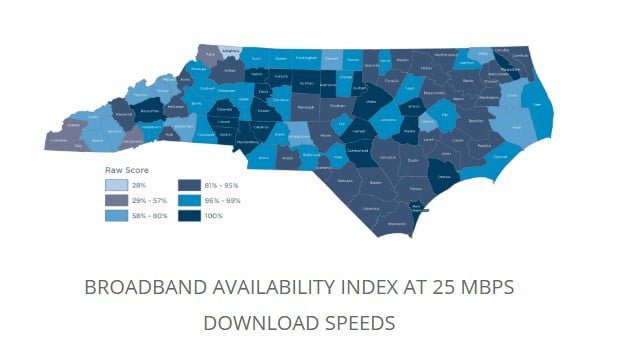
RALEIGH — North Carolina has some of the best overall internet connectivity rates in the Southeast, but some areas still have no internet access at broadband-speed levels, according to the Federal Communications Commission.
The areas with the least access to broadband internet in North Carolina are in low population, rural or economically disadvantaged areas. The state’s Growing Rural Economies with Access to Technology (GREAT) Program is seeking to change that.
“Broadband is an essential utility for all North Carolinians in today’s global economy, and the GREAT program is successfully delivering on the General Assembly’s promise to encourage and assist providers in deploying internet connectivity at the highest possible speeds,” said Rep. Dean Arp (R-Union), who has helped to spearhead the program on the House side.
The GREAT program provides grants to private providers of broadband services to facilitate the deployment of broadband service to unserved areas and funds eligible projects in economically distressed counties.
The overall thrust of the program is the use of existing infrastructure where possible to get broadband access into rural areas. The GREAT program is supposed to help communities work directly with providers to bring services in or to facilitate the leveraging of public-private partnerships to expand access.

Image via: NC DIT Broadband Infrastructure Office
Rural areas can expect broadband services with transmission speeds of at least 10 Mbps download, and at least 1 Mbps upload, but higher speeds in some areas may be possible.
The appeal of broadband access is clear for educational purposes in K-12 schools, but it also has benefits for households in terms of the ability to stream video for entertainment or for teleworking from one’s home.
The expansion of broadband can have a positive impact on economic prospects of an area by making a town or municipality more attractive to prospective employers. It can also enhance public safety and speed of communications for first responders, hospitals and government entities dealing with disaster situations.
“High-speed internet access is as critical to economic growth today as traditional utilities like roads, sewers, and electricity, and the GREAT program offers more North Carolina communities a link to a successful future in our rapidly growing state,” said Arp.
A central qualification in applying for GREAT grants is providing evidence of need and of support for broadband expansion by a local government, the citizens in the area or other businesses and institutions, like schools or hospitals.
Grants are awarded on a points system that determines the percentage of the funding matched by the state. The points awarded are based on the cost and number of households and various entities are being served, minimum transfer rate speeds and how many partners are involved in the project.
During the broadband expansion process, it was found that even where there is existing broadband access, people have been slow to subscribe to it, so another side to the GREAT program is an attempt to increase broadband subscriber rates overall.
North Carolina has been expanding rural broadband and increasing connectivity since 2015. That year’s budget directed the state CIO to formulate a broadband plan.
In the 2017-2018 budget, the General Assembly included $10 million in grants to expand rural broadband. The current state budget increases that amount to $15 million.
“After only 1 year, the GREAT program has shown great success, but there is still much to do,” said Senate Majority Leader Harry Brown (R-Onslow).
Brown, like Arp, has been a major proponent of the GREAT program.
“The program originally opened only to Tier 1 counties to make sure the most economically-distressed counties were addressed first, but beginning in July 2020, the program will be open to Tier 2 counties, as well,” Brown said.
Twenty-one applicants in 19 counties received over $16.5 million in grants under the GREAT program in 2019. State funds provided around $9.8 million and 14 private companies contributed close to $6.7 million.
The 19 counties receiving GREAT program grants are: Bertie, Bladen, Caswell, Chowan, Clay, Columbus, Gates, Greene, Halifax, Hertford, Jackson, Jones, Lenoir, Macon, McDowell, Northampton, Person, Swain and Vance.
An estimated 9,800 households have broadband access as a result of the GREAT program. In addition, access will be expanded to an estimated 590 businesses, community-related offices and schools.
The program is expected to spend $30 million over the next two years and $150 million in the next 10 years.



